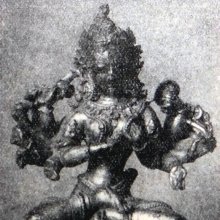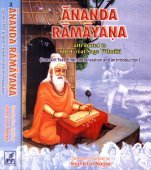Sumati, Sumatī: 26 definitions
Introduction:
Sumati means something in Buddhism, Pali, Hinduism, Sanskrit, Jainism, Prakrit, Hindi. If you want to know the exact meaning, history, etymology or English translation of this term then check out the descriptions on this page. Add your comment or reference to a book if you want to contribute to this summary article.
Sumati has 26 English definitions available.
Images (photo gallery)
Languages of India and abroad
Sanskrit dictionary
[Deutsch Wörterbuch]
Source: Cologne Digital Sanskrit Dictionaries: Böhtlingk and Roth Grosses Petersburger WörterbuchSumati (सुमति):—
--- OR ---
Sumati (सुमति):—2.
1) adj. klug, verständig [Spr. (II) 3116. 7119.] [morgenländischen Gesellschaft 27, 17.] [PAÑCAR. 3, 7, 27] (samuti gedr.). [Bhāgavatapurāṇa 10, 60, 38.] [Pañcatantra 25, 13.] [Daśakumāracarita 2, 8] (mit der ed. Calc. sumatirlī zu lesen). [Oxforder Handschriften 148,a,4 v. u.] vollkommen vertraut mit (gen.): vidyānāṃ kalānāṃ ca sarvāsām [Kathāsaritsāgara 44, 23.] —
2) m. Nomen proprium a) eines Daitya [Mahābhārata 2, 365.] [Harivaṃśa 12696] nach der Lesart der neueren Ausg., sunati die ältere. — b) verschiedener Männer: ein Ṛṣi [Mahābhārata 13,1761.] [Oxforder Handschriften 264,a,5.] unter Manu Sāvarṇa [Harivaṃśa 465.] ein Sohn Bhṛgu’s [Weber’s Indische Studien 1, 235.] eines Bhārgava [Mārkāṇḍeyapurāṇa 10, 8. fgg.] ein Ātreya [Oxforder Handschriften 55,b,40.] ein Schüler Sūta’s [Viṣṇupurāṇa 283.] ein Fürst [Oxforder Handschriften 10,b,8.] ein Sohn Bharata's [Viṣṇupurāṇa 164.] [Mārkāṇḍeyapurāṇa 53, 41.] [Bhāgavatapurāṇa 5, 7, 3. 15, 1.] Somadatta's [9, 2, 36.] [Rāmāyaṇa 1, 47, 17. 20.] Supārśva’s [Harivaṃśa 1079. fg.] [Viṣṇupurāṇa 453.] [Bhāgavatapurāṇa 9, 21, 28.] Janamejaya's [Viṣṇupurāṇa 354.] Dṛḍhasena’s [465.] [Bhāgavatapurāṇa 9, 22, 47.] Nṛga’s [2, 17.] Ṛteyu’s [20, 6. 7.] Vidūratha’s [Mārkāṇḍeyapurāṇa 116, 10.] Nomen proprium des 5ten Arhant's der gegenwärtigen Avasarpiṇī [Hemacandra’s Abhidhānacintāmaṇi 26.] des 13ten Arhant's der vergangenen Utsarpiṇī [?52. - Mālavikāgnimitra 67, 16. Kathāsaritsāgara 120, 14. Daśakumāracarita 9, 20. Pañcatantra 4, 16 (1, 19 ed. orn.). Rgva tch’er rol pa ed. Calc. 202, 5. Lot. de Lassen’s Anthologie b. l. 12.] —
3) ti und tī Nomen proprium einer Frau Sagara's [Rāmāyaṇa 1, 39, 4. 14 (40, 14. 17 Gorresio).] [Viṣṇupurāṇa 377.] [Bhāgavatapurāṇa 9, 8, 8.] einer Tochter Kratu's [Viṣṇupurāṇa 83,] [Nalopākhyāna 7.] der Frau des Viṣṇuyaśas und Mutter Kalkin's [KALKI-Pāṇini’s acht Bücher 2 im Śabdakalpadruma] einer Fee [TĀRAN. 277.]
Sanskrit, also spelled संस्कृतम् (saṃskṛtam), is an ancient language of India commonly seen as the grandmother of the Indo-European language family (even English!). Closely allied with Prakrit and Pali, Sanskrit is more exhaustive in both grammar and terms and has the most extensive collection of literature in the world, greatly surpassing its sister-languages Greek and Latin.
See also (Relevant definitions)
Starts with (+7): Sumatibhadra, Sumatibodha, Sumatiharsha, Sumatijitamitramalladeva, Sumatikrita, Sumatimerugani, Sumatimjaya, Sumatinatha, Sumatinathacaritra, Sumatinathagita, Sumatindra yati, Sumatindrajayaghoshana, Sumatindratirtha, Sumatindrayati, Sumatiratna, Sumatiratnarya, Sumatirenu, Sumatisadhu, Sumatisadhusuri, Sumatisajjhaya.
Ends with: Amshumati, Ansumati, Apsumati, Asumati, Basumati, Candrasumati, Chandrasumati, Devasumati, Ikshumati, Ishvarasumati, Jagativasumati, Pamshumati, Shantasumati, Shishumati, Vasumati, Vishvavasumati.
Full-text (+112): Bhutajyoti, Vriddhasena, Sagara, Sannatiman, Devatajit, Raibhya, Sumatinatha, Tsaru, Suparshva, Megha, Mahamati, Susai, Sunati, Madhura, Ayajyu, Arishtagrama, Aprayuta, Pitasumatisamvada, Devadyumna, Shantasumati.
Relevant text
Search found 58 books and stories containing Sumati, Sumatī, Sūmati; (plurals include: Sumatis, Sumatīs, Sūmatis). You can also click to the full overview containing English textual excerpts. Below are direct links for the most relevant articles:
Rig Veda (translation and commentary) (by H. H. Wilson)
Women in the Atharva-veda Samhita (by Pranab Jyoti Kalita)
2. Hymns to Obtain a Husband < [Chapter 2 - The Strīkarmāṇi Hymns of the Atharvaveda]
The Tattvasangraha [with commentary] (by Ganganatha Jha)
Verse 1277 < [Chapter 17 - Examination of the Definition of Sense-perception]
Verse 1265-1267 < [Chapter 17 - Examination of the Definition of Sense-perception]
Verse 1980-1983 < [Chapter 23 - External World]
Sumati Satakamu and the Essays of < [October – December, 1997]
Trickles of Wisdom (English Version of Verses < [July – September, 2005]
The Husband < [April – June, 1990]
The Skanda Purana (by G. V. Tagare)
Chapter 14 - The Greatness of Svāmipuṣkariṇī: Sumati < [Section 1 - Veṅkaṭācala-māhātmya]
Chapter 34 - The Glory of Dhanuṣkoṭi: Sumati’s Liberation from Great Sins < [Section 1 - Setu-māhātmya]
Chapter 19 - The Greatness of Pāpavināśana Tīrtha < [Section 1 - Veṅkaṭācala-māhātmya]
Related products




